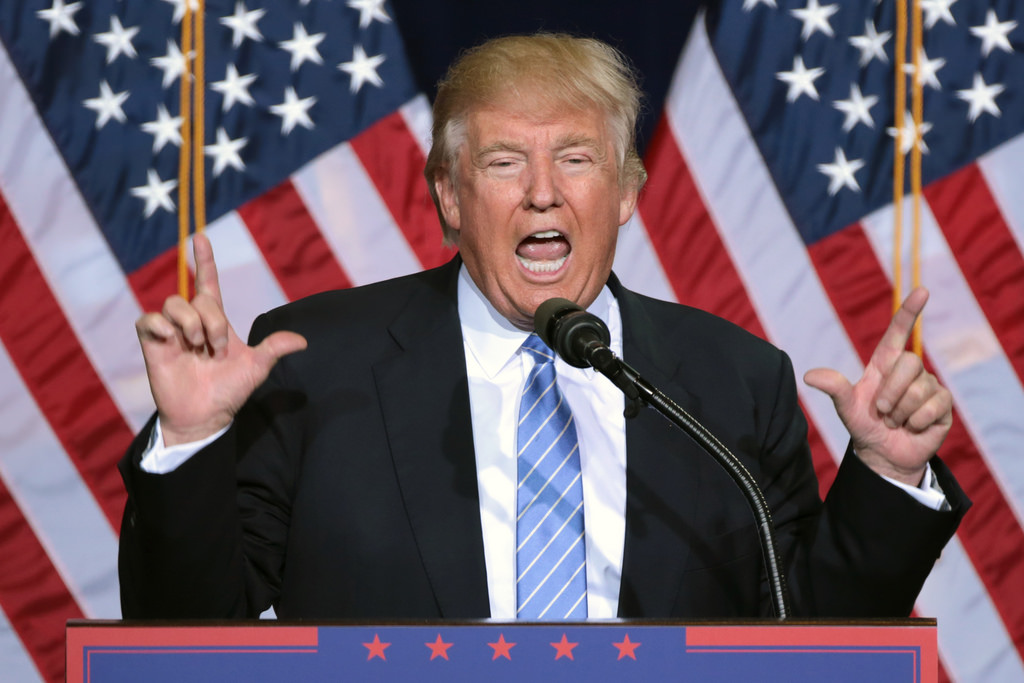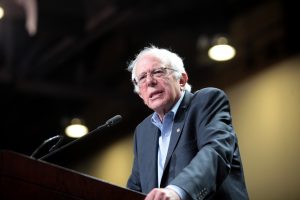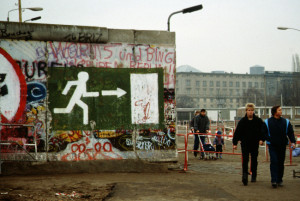by Andrew Bacevich
The fall of the Berlin Wall in October 1989 abruptly ended one historical era and inaugurated another. So, too, did the outcome of last year’s U.S. presidential election. What are we to make of the interval between those two watershed moments? Answering that question is essential to understanding how Donald Trump became president and where his ascendency leaves us.
Hardly had this period commenced before observers fell into the habit of referring to it as the “post-Cold War” era. Now that it’s over, a more descriptive name might be in order. My suggestion: America’s Age of Great Expectations.
Forgive and Forget
The end of the Cold War caught the United States completely by surprise. During the 1980s, even with Mikhail Gorbachev running the Kremlin, few in Washington questioned the prevailing conviction that the Soviet-American rivalry was and would remain a defining feature of international politics more or less in perpetuity. Indeed, endorsing such an assumption was among the prerequisites for gaining entrée to official circles. Virtually no one in the American establishment gave serious thought to the here-today, gone-tomorrow possibility that the Soviet threat, the Soviet empire, and the Soviet Union itself might someday vanish. Washington had plans aplenty for what to do should a Third World War erupt, but none for what to do if the prospect of such a climactic conflict simply disappeared.
Still, without missing a beat, when the Berlin Wall fell and two years later the Soviet Union imploded, leading members of that establishment wasted no time in explaining the implications of developments they had totally failed to anticipate. With something close to unanimity, politicians and policy-oriented intellectuals interpreted the unification of Berlin and the ensuing collapse of communism as an all-American victory of cosmic proportions. “We” had won, “they” had lost — with that outcome vindicating everything the United States represented as the archetype of freedom.
From within the confines of that establishment, one rising young intellectual audaciously suggested that the “end of history” itself might be at hand, with the “sole superpower” left standing now perfectly positioned to determine the future of all humankind. In Washington, various powers-that-be considered this hypothesis and concluded that it sounded just about right. The future took on the appearance of a blank slate upon which Destiny itself was inviting Americans to inscribe their intentions.
American elites might, of course, have assigned a far different, less celebratory meaning to the passing of the Cold War. They might have seen the outcome as a moment that called for regret, repentance, and making amends.
After all, the competition between the United States and the Soviet Union, or more broadly between what was then called the Free World and the Communist bloc, had yielded a host of baleful effects. An arms race between two superpowers had created monstrous nuclear arsenals and, on multiple occasions, brought the planet precariously close to Armageddon. Two singularly inglorious wars had claimed the lives of many tens of thousands of American soldiers and literally millions of Asians. One, on the Korean peninsula, had ended in an unsatisfactory draw; the other, in Southeast Asia, in catastrophic defeat. Proxy fights in Asia, Africa, Latin America, and the Middle East killed so many more and laid waste to whole countries. Cold War obsessions led Washington to overthrow democratic governments, connive in assassination, make common cause with corrupt dictators, and turn a blind eye to genocidal violence. On the home front, hysteria compromised civil liberties and fostered a sprawling, intrusive, and unaccountable national security apparatus. Meanwhile, the military-industrial complex and its beneficiaries conspired to spend vast sums on weapons purchases that somehow never seemed adequate to the putative dangers at hand.
Rather than reflecting on such somber and sordid matters, however, the American political establishment together with ambitious members of the country’s intelligentsia found it so much more expedient simply to move on. As they saw it, the annus mirabilis of 1989 wiped away the sins of former years. Eager to make a fresh start, Washington granted itself a plenary indulgence. After all, why contemplate past unpleasantness when a future so stunningly rich in promise now beckoned?
Three Big Ideas and a Dubious Corollary
Soon enough, that promise found concrete expression. In remarkably short order, three themes emerged to define the new American age. Informing each of them was a sense of exuberant anticipation toward an era of almost unimaginable expectations. The twentieth century was ending on a high note. For the planet as a whole but especially for the United States, great things lay ahead.
Focused on the world economy, the first of those themes emphasized the transformative potential of turbocharged globalization led by U.S.-based financial institutions and transnational corporations. An “open world” would facilitate the movement of goods, capital, ideas, and people and thereby create wealth on an unprecedented scale. In the process, the rules governing American-style corporate capitalism would come to prevail everywhere on the planet. Everyone would benefit, but especially Americans who would continue to enjoy more than their fair share of material abundance.
Focused on statecraft, the second theme spelled out the implications of an international order dominated as never before — not even in the heydays of the Roman and British Empires — by a single nation. With the passing of the Cold War, the United States now stood apart as both supreme power and irreplaceable global leader, its status guaranteed by its unstoppable military might.
In the editorial offices of the Wall Street Journal, the Washington Post, the New Republic, and the Weekly Standard, such “truths” achieved a self-evident status. Although more muted in their public pronouncements than Washington’s reigning pundits, officials enjoying access to the Oval Office, the State Department’s 7th floor, and the E-ring of the Pentagon generally agreed. The assertive exercise of (benign!) global hegemony seemingly held the key to ensuring that Americans would enjoy safety and security, both at home and abroad, now and in perpetuity.
The third theme was all about rethinking the concept of personal freedom as commonly understood and pursued by most Americans. During the protracted emergency of the Cold War, reaching an accommodation between freedom and the putative imperatives of national security had not come easily. Cold War-style patriotism seemingly prioritized the interests of the state at the expense of the individual. Yet even as thrillingly expressed by John F. Kennedy — “Ask not what your country can do for you, ask what you can do for your country” — this was never an easy sell, especially if it meant wading through rice paddies and getting shot at.
Once the Cold War ended, however, the tension between individual freedom and national security momentarily dissipated. Reigning conceptions of what freedom could or should entail underwent a radical transformation. Emphasizing the removal of restraints and inhibitions, the shift made itself felt everywhere, from patterns of consumption and modes of cultural expression to sexuality and the definition of the family. Norms that had prevailed for decades if not generations — marriage as a union between a man and a woman, gender identity as fixed at birth — became passé. The concept of a transcendent common good, which during the Cold War had taken a backseat to national security, now took a backseat to maximizing individual choice and autonomy.
Finally, as a complement to these themes, in the realm of governance, the end of the Cold War cemented the status of the president as quasi-deity. In the Age of Great Expectations, the myth of the president as a deliverer from (or, in the eyes of critics, the ultimate perpetrator of) evil flourished. In the solar system of American politics, the man in the White House increasingly became the sun around which everything seemed to orbit. By comparison, nothing else much mattered.
From one administration to the next, of course, presidential efforts to deliver Americans to the Promised Land regularly came up short. Even so, the political establishment and the establishment media collaborated in sustaining the pretense that out of the next endlessly hyped “race for the White House,” another Roosevelt or Kennedy or Reagan would magically emerge to save the nation. From one election cycle to the next, these campaigns became longer and more expensive, drearier and yet ever more circus-like. No matter. During the Age of Great Expectations, the reflexive tendency to see the president as the ultimate guarantor of American abundance, security, and freedom remained sacrosanct.
Blindsided
Meanwhile, between promise and reality, a yawning gap began to appear. During the concluding decade of the twentieth century and the first decade-and-a-half of the twenty-first, Americans endured a seemingly endless series of crises. Individually, none of these merit comparison with, say, the Civil War or World War II. Yet never in U.S. history has a sequence of events occurring in such close proximity subjected American institutions and the American people to greater stress.
During the decade between 1998 and 2008, they came on with startling regularity: one president impeached and his successor chosen by the direct intervention of the Supreme Court; a massive terrorist attack on American soil that killed thousands, traumatized the nation, and left senior officials bereft of their senses; a mindless, needless, and unsuccessful war of choice launched on the basis of false claims and outright lies; a natural disaster (exacerbated by engineering folly) that all but destroyed a major American city, after which government agencies mounted a belated and half-hearted response; and finally, the worst economic downturn since the Great Depression, bringing ruin to millions of families.
For the sake of completeness, we should append to this roster of seismic occurrences one additional event: Barack Obama’s election as the nation’s first black president. He arrived at the zenith of American political life as a seemingly messianic figure called upon not only to undo the damage wrought by his predecessor, George W. Bush, but somehow to absolve the nation of its original sins of slavery and racism.
Yet during the Obama presidency race relations, in fact, deteriorated. Whether prompted by cynical political calculations or a crass desire to boost ratings, race baiters came out of the woodwork — one of them, of course, infamously birthered in Trump Tower in mid-Manhattan — and poured their poisons into the body politic. Even so, as the end of Obama’s term approached, the cult of the presidency itself remained remarkably intact.
Individually, the impact of these various crises ranged from disconcerting to debilitating to horrifying. Yet to treat them separately is to overlook their collective implications, which the election of Donald Trump only now enables us to appreciate. It was not one president’s dalliance with an intern or “hanging chads” or 9/11 or “Mission Accomplished” or the inundation of the Lower Ninth Ward or the collapse of Lehman Brothers or the absurd birther movement that undermined the Age of Great Expectations. It was the way all these events together exposed those expectations as radically suspect.
In effect, the various crises that punctuated the post-Cold War era called into question key themes to which a fevered American triumphalism had given rise. Globalization, militarized hegemony, and a more expansive definition of freedom, guided by enlightened presidents in tune with the times, should have provided Americans with all the blessings that were rightly theirs as a consequence of having prevailed in the Cold War. Instead, between 1989 and 2016, things kept happening that weren’t supposed to happen. A future marketed as all but foreordained proved elusive, if not illusory. As actually experienced, the Age of Great Expectations became an Age of Unwelcome Surprises.
A Candidate for Decline
True, globalization created wealth on a vast scale, just not for ordinary Americans. The already well-to-do did splendidly, in some cases unbelievably so. But middle-class incomes stagnated and good jobs became increasingly hard to find or keep. By the election of 2016, the United States looked increasingly like a society divided between haves and have-nots, the affluent and the left-behind, the 1% and everyone else. Prospective voters were noticing.
Meanwhile, policies inspired by Washington’s soaring hegemonic ambitions produced remarkably few happy outcomes. With U.S. forces continuously engaged in combat operations, peace all but vanished as a policy objective (or even a word in Washington’s political lexicon). The acknowledged standing of the country’s military as the world’s best-trained, best-equipped, and best-led force coexisted uneasily with the fact that it proved unable to win. Instead, the national security establishment became conditioned to the idea of permanent war, high-ranking officials taking it for granted that ordinary citizens would simply accommodate themselves to this new reality. Yet it soon became apparent that, instead of giving ordinary Americans a sense of security, this new paradigm induced an acute sense of vulnerability, which left many susceptible to demagogic fear mongering.
As for the revised definition of freedom, with autonomy emerging as the national summum bonum, it left some satisfied but others adrift. During the Age of Great Expectations, distinctions between citizen and consumer blurred. Shopping became tantamount to a civic obligation, essential to keeping the economy afloat. Yet if all the hoopla surrounding Black Friday and Cyber Monday represented a celebration of American freedom, its satisfactions were transitory at best, rarely extending beyond the due date printed on a credit card statement. Meanwhile, as digital connections displaced personal ones, relationships, like jobs, became more contingent and temporary. Loneliness emerged as an abiding affliction. Meanwhile, for all the talk of empowering the marginalized — people of color, women, gays — elites reaped the lion’s share of the benefits while ordinary people were left to make do. The atmosphere was rife with hypocrisy and even a whiff of nihilism.
To these various contradictions, the establishment itself remained stubbornly oblivious, with the 2016 presidential candidacy of Hillary Clinton offering a case in point. As her long record in public life made abundantly clear, Clinton embodied the establishment in the Age of Great Expectations. She believed in globalization, in the indispensability of American leadership backed by military power, and in the post-Cold War cultural project. And she certainly believed in the presidency as the mechanism to translate aspirations into outcomes.
Such commonplace convictions of the era, along with her vanguard role in pressing for the empowerment of women, imparted to her run an air of inevitability. That she deserved to win appeared self-evident. It was, after all, her turn. Largely overlooked were signs that the abiding themes of the Age of Great Expectations no longer commanded automatic allegiance.
Gasping for Air
Senator Bernie Sanders offered one of those signs. That a past-his-prime, self-professed socialist from Vermont with a negligible record of legislative achievement and tenuous links to the Democratic Party might mount a serious challenge to Clinton seemed, on the face of it, absurd. Yet by zeroing in on unfairness and inequality as inevitable byproducts of globalization, Sanders struck a chord.
Knocked briefly off balance, Clinton responded by modifying certain of her longstanding positions. By backing away from free trade, the ne plus ultra of globalization, she managed, though not without difficulty, to defeat the Sanders insurgency. Even so, he, in effect, served as the canary in the establishment coal mine, signaling that the Age of Great Expectations might be running out of oxygen.
A parallel and far stranger insurgency was simultaneously wreaking havoc in the Republican Party. That a narcissistic political neophyte stood the slightest chance of capturing the GOP seemed even more improbable than Sanders taking a nomination that appeared Clinton’s by right.
Coarse, vulgar, unprincipled, uninformed, erratic, and with little regard for truth, Trump was sui generis among presidential candidates. Yet he possessed a singular gift: a knack for riling up those who nurse gripes and are keen to pin the blame on someone or something. In post-Cold War America, among the millions that Hillary Clinton was famously dismissing as “deplorables,” gripes had been ripening like cheese in a hothouse.
Through whatever combination of intuition and malice aforethought, Trump demonstrated a genius for motivating those deplorables. He pushed their buttons. They responded by turning out in droves to attend his rallies. There they listened to a message that they found compelling.
In Trump’s pledge to “make America great again” his followers heard a promise to restore everything they believed had been taken from them in the Age of Great Expectations. Globalization was neither beneficial nor inevitable, the candidate insisted, and vowed, once elected, to curb its effects along with the excesses of corporate capitalism, thereby bringing back millions of lost jobs from overseas. He would, he swore, fund a massive infrastructure program, cut taxes, keep a lid on the national debt, and generally champion the cause of working stiffs. The many complications and contradictions inherent in these various prescriptions would, he assured his fans, give way to his business savvy.
In considering America’s role in the post-Cold War world, Trump exhibited a similar impatience with the status quo. Rather than allowing armed conflicts to drag on forever, he promised to win them (putting to work his mastery of military affairs) or, if not, to quit and get out, pausing just long enough to claim as a sort of consolation prize whatever spoils might be lying loose on the battlefield. At the very least, he would prevent so-called allies from treating the United States like some patsy. Henceforth, nations benefitting from American protection were going to foot their share of the bill. What all of this added up to may not have been clear, but it did suggest a sharp departure from the usual post-1989 formula for exercising global leadership.
No less important than Trump’s semi-coherent critique of globalization and American globalism, however, was his success in channeling the discontent of all those who nursed an inchoate sense that post-Cold War freedoms might be working for some, but not for them.
Not that Trump had anything to say about whether freedom confers obligations, or whether conspicuous consumption might not actually hold the key to human happiness, or any of the various controversies related to gender, sexuality, and family. He was indifferent to all such matters. He was, however, distinctly able to offer his followers a grimly persuasive explanation for how America had gone off course and how the blessings of liberties to which they were entitled had been stolen. He did that by fingering as scapegoats Muslims, Mexicans, and others “not-like-me.”
Trump’s political strategy reduced to this: as president, he would overturn the conventions that had governed right thinking since the end of the Cold War. To the amazement of an establishment grown smug and lazy, his approach worked. Even while disregarding all received wisdom when it came to organizing and conducting a presidential campaign in the Age of Great Expectations, Trump won. He did so by enchanting the disenchanted, all those who had lost faith in the promises that had sprung from the bosom of the elites that the end of the Cold War had taken by surprise.
Adrift Without a Compass
Within hours of Trump’s election, among progressives, expressing fear and trepidation at the prospect of what he might actually do on assuming office became de rigueur. Yet those who had actually voted for Trump were also left wondering what to expect. Both camps assign him the status of a transformative historical figure. However, premonitions of incipient fascism and hopes that he will engineer a new American Golden Age are likely to prove similarly misplaced. To focus on the man himself rather than on the circumstances that produced him is to miss the significance of what has occurred.
Note, for example, that his mandate is almost entirely negative. It centers on rejection: of globalization, of counterproductive military meddling, and of the post-Cold War cultural project. Yet neither Trump nor any of his surrogates has offered a coherent alternative to the triad of themes providing the through line for the last quarter-century of American history. Apart a lingering conviction that forceful — in The Donald’s case, blustering — presidential leadership can somehow turn things around, “Trumpism” is a dog’s breakfast.
In all likelihood, his presidency will prove less transformative than transitional. As a result, concerns about what he may do, however worrisome, matter less than the larger question of where we go from here. The principles that enjoyed favor following the Cold War have been found wanting. What should replace them?
Efforts to identify those principles should begin with an honest accounting of the age we are now leaving behind, the history that happened after “the end of history.” That accounting should, in turn, allow room for regret, repentance, and making amends — the very critical appraisal that ought to have occurred at the end of the Cold War but was preempted when American elites succumbed to their bout of victory disease.
Don’t expect Donald Trump to undertake any such appraisal. Nor will the establishment that candidate Trump so roundly denounced, but which President-elect Trump, at least in his senior national security appointments, now shows sign of accommodating. Those expecting Trump’s election to inject courage into members of the political class or imagination into inside-the-Beltway “thought leaders” are in for a disappointment. So the principles we need — an approach to political economy providing sustainable and equitable prosperity; a foreign policy that discards militarism in favor of prudence and pragmatism; and an enriched, inclusive concept of freedom — will have to come from somewhere else.
“Where there is no vision,” the Book of Proverbs tells us, “the people perish.” In the present day, there is no vision to which Americans collectively adhere. For proof, we need look no further than the election of Donald Trump.
The Age of Great Expectations has ended, leaving behind an ominous void. Yet Trump’s own inability to explain what should fill that great void provides neither excuse for inaction nor cause for despair. Instead, Trump himself makes manifest the need to reflect on the nation’s recent past and to think deeply about its future.
A decade before the Cold War ended, writing in democracy, a short-lived journal devoted to “political renewal and radical change,” the historian and social critic Christopher Lasch sketched out a set of principles that might lead us out of our current crisis. Lasch called for a politics based on “the nurture of the soil against the exploitation of resources, the family against the factory, the romantic vision of the individual against the technological vision, [and] localism over democratic centralism.” Nearly a half-century later, as a place to begin, his prescription remains apt.
Printed, with permission, from TomDispatch. Photo of Donald Trump by Gage Skidmore via Flickr.
Andrew J. Bacevich, a TomDispatch regular, is professor emeritus of history and international relations at Boston University. His most recent book isAmerica’s War for the Greater Middle East: A Military History. Follow TomDispatch on Twitter and join us on Facebook. Check out the newest Dispatch Book, John Feffer’s dystopian novel Splinterlands, as well as Nick Turse’s Next Time They’ll Come to Count the Dead, and Tom Engelhardt’s latest book, Shadow Government: Surveillance, Secret Wars, and a Global Security State in a Single-Superpower World. Copyright 2017 Andrew J. Bacevich






Thank you, Andrew Bacevich. Given all the hysteria about “fake news” — the most hysteria coming from the source unsurpassed in the production of “fake news”, namely Washington — we really need your excellent narrative tracing the history of how the US crumbled without a big powerful adversary to keep it on its toes.
This piece, together with Jeffrey Sachs’ “Learning to Love Multipolarity” over at Project Syndicate, should be required reading for anyone who wants to set their mind to the task of figuring out where Americans might go from here.